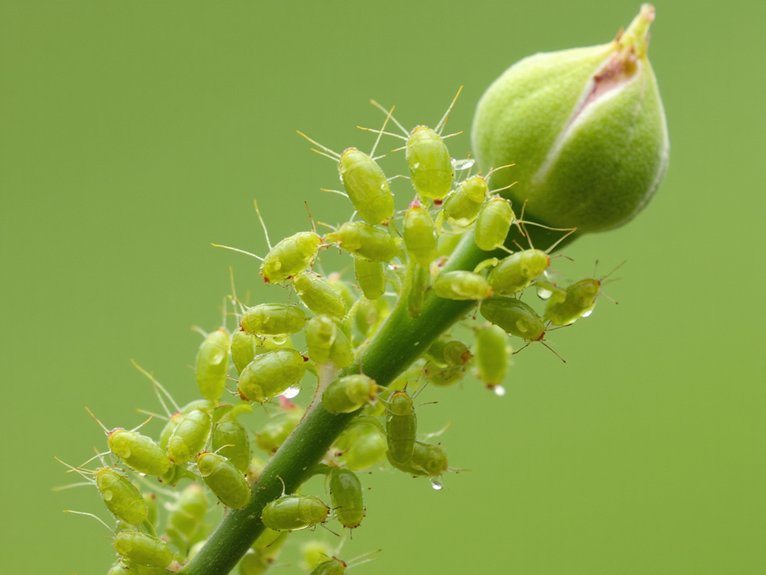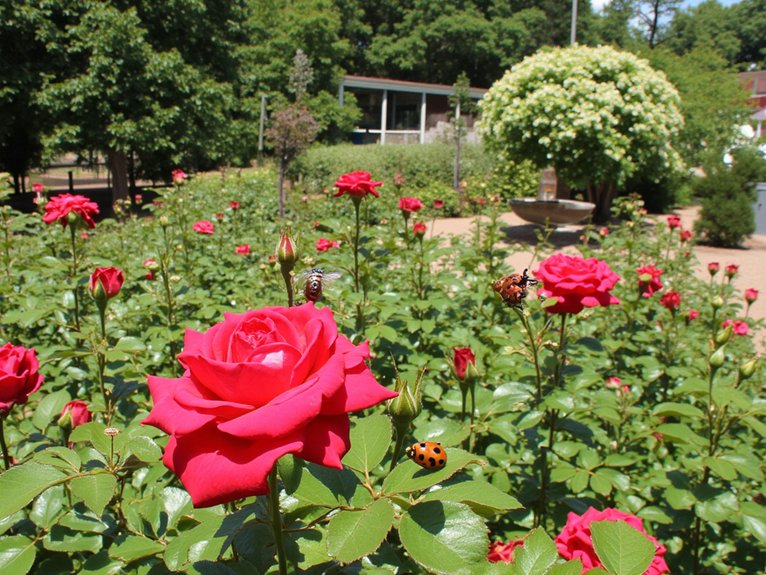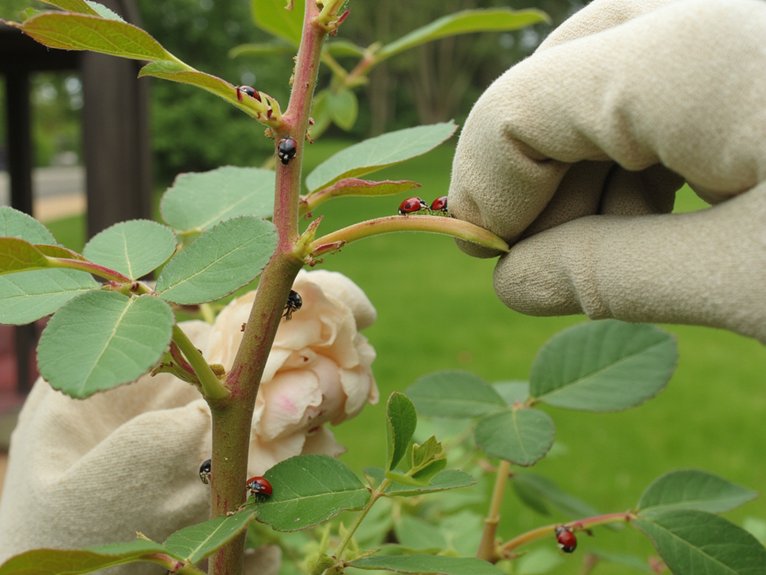You’ve noticed those tiny green insects clustering on your precious rose stems and buds – they’re aphids, and they’re threatening your garden’s beauty. “Aphids can multiply from a few individuals to thousands in just weeks,” warns Susan McKenzie, master gardener at Portland Rose Gardens. While these soft-bodied pests may seem unstoppable, you don’t need harsh chemicals to protect your roses. Learn how natural methods and smart planning can help you win the battle against these persistent invaders.
Contents
Understanding Your Tiny Rose Enemies

The tiny but troublesome rose aphid, Macrosiphum Rosae, leads the pack of roughly 250 aphid species that feed on garden plants. You’ll spot these pear-shaped pests in light green, pink, or brown colors, clustering on your rose stems and leaves.
These crafty creatures reproduce rapidly, switching between asexual reproduction in spring and sexual reproduction in fall. As they feed, they’ll weaken your plant’s health by:
- Sucking essential sap from stems and leaves
- Secreting sticky honeydew that attracts black sooty mold
- Transmitting harmful plant viruses between roses
Nature’s Way: The Garden Hose Method
When those pesky aphids start clustering on your roses, reaching for your garden hose offers a surprisingly effective first line of defense. Simply adjust your nozzle to a strong but focused spray setting and target those unwanted visitors.
Here’s how to maximize aphid removal:
- Direct water pressure at the undersides of leaves where aphids hide
- Spray in the morning so plants dry before evening
- Repeat every 2-3 days until aphids are gone
- Focus on new growth where aphids congregate
Most aphids won’t make it back to your roses, and any survivors face natural predators in the soil below.
Building Your Aphid Defense Team

While blasting aphids with water provides immediate relief, building a long-term defense system through beneficial insects offers more sustainable protection. You’ll want to attract nature’s pest control experts – ladybugs, hoverflies, and parasitic wasps – by planting their favorite predator plants.
Create your aphid defense team by:
- Adding yarrow, penstemon, and sweet alyssum around roses
- Spacing beneficial-attracting plants 12-18 inches from rose bases
- Maintaining diverse flowering periods for continuous protection
- Avoiding pesticides that harm your garden allies
“A well-planned beneficial insect habitat can reduce aphid populations by 80% within two weeks,” notes entomologist Dr. Sarah Chen.
Smart Planting Strategies for Aphid Control
Strategic placement of specific plants throughout your garden creates natural barriers that confuse and repel aphids before they reach your roses. Through smart companion planting, you’ll build a living defense system that works year-round.
Plant marigolds and basil around your rose beds – they’re natural aphid deterrents. Add yarrow and sweet alyssum nearby to attract beneficial insects like ladybugs and hoverflies. “Creating diversity in your garden isn’t just beautiful; it’s a proven pest management strategy,” notes entomologist Dr. Sarah Chen.
Remember to space your companion plants 12-18 inches from roses to prevent root competition.
Taking Action: Hand-To-Hand Combat With Aphids

Smart companion planting provides long-term protection, but sometimes you’ll need to take direct action against aphids. Regular pest monitoring helps you catch infestations early in the aphid lifecycle, when they’re easiest to control.
Here’s your battle plan:
- Inspect roses weekly, focusing on leaf undersides and new growth
- Put on washable gardening gloves
- Firmly squeeze any aphids you find between your fingers
- Remove heavily infested leaves and destroy them
- Hose down remaining aphids with a strong water spray
- Check back in 2-3 days and repeat if needed
Safe Sprays When Nature Needs Help
Even though natural pest control methods should be your first defense, sometimes aphid populations grow too quickly and require a helping hand from safe sprays. When choosing safe spray options, consider organic insecticides like horticultural oils and insecticidal soaps.
Apply neem oil in the evening to protect beneficial insects, but never spray when temperatures exceed 85°F. For insecticidal soap treatments, thoroughly coat the aphids for maximum effectiveness. “These gentler solutions offer temporary relief without disrupting your garden’s ecosystem,” notes entomologist Dr. Sarah Chen.
Remember to test sprays on a small area first and reapply weekly until aphid populations decrease.
